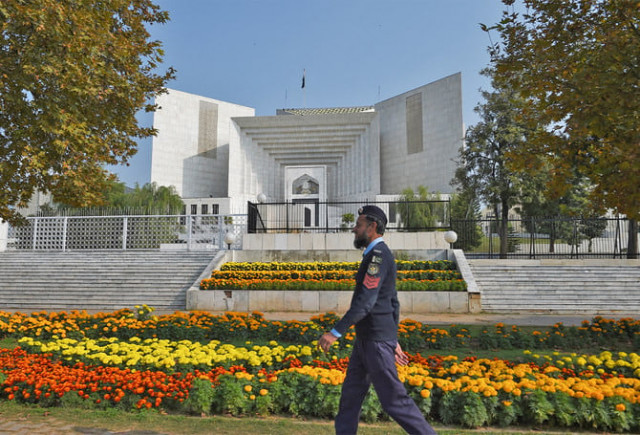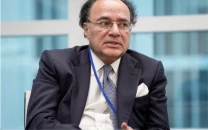NAB submits plea bargaining record to SC
Anti-graft body’s prosecutor tells court 280 cases withdrawn after amendments

The National Accountability Bureau (NAB) on Thursday submitted to the Supreme Court the details of plea bargaining in the last 21 years on a petition filed by PTI chairman and deposed premier Imran Khan against the recent changes in the country’s anti-graft law.
A three-judge bench, comprising Chief Justice of Pakistan Umar Ata Bandial, Justice Ijazul Ahsan, and Justice Syed Mansoor Ali Shah, was hearing the plea petition filed by the PTI chief, wherein he had argued that the amendments to the accountability law were in violation of fundamental rights.
To a query by the CJP, the NAB prosecutor replied that following the amendments, 280 cases had been withdrawn and a committee would review them.
Imran’s lawyer Khawaja Haris maintained that as per the amendments, plea bargaining would absolve the culprit of both their crime and punishment.
To this, Justice Ahsan inquired if the cancellation of the plea bargaining end the crime along with the punishment.
He added that plea bargaining was a confession of a crime in which the court approved the return of money.
“How can the punishment given by the court be abolished by legislation?” the judge remarked.
Justice Ahsan further noted that even the president could forgive the culprit on an appeal for mercy but that did not mean the crime had not been committed.
Justice Shah inquired that if plea bargaining ended, how could the crime continue?
In a murder case, both the sentence and the court’s decision were terminated after the consent, he added.
The judge further noted that if the crime of a murderer could be expunged, why not that of someone accused of committing corruption?
Justice Ahsan noted that if the corruption was less than Rs500 million, the case would also end with plea bargaining.
He quipped that corruption worth Rs490 million was fine, but if it exceeded that figure, it was wrong.
Haris argued that along with the cabinet and other forums, special assistants had also been exempted as per the amendments. Apart from this, the changes would also be applied to foreign assets, he added.
He claimed that the changes in the accountability law were aimed at protecting those involved in corruption.
The CJP inquired whether or not a common person, who had benefited from the amnesty scheme, could also come on the NAB radar.
“Our society is such that businessmen have to pay bribes in many places. Will they be punished even for doing business?” he asked.
Imran’s lawyer replied that those who facilitated money laundering of public officials would certainly come under the NAB radar.
Justice Shah inquired whether the amendments to the NAB law were not made in the light of court decisions.
To which Imran's lawyer replied that amendments had been made by misinterpreting the court decisions.
Haris further told the court that the name and amount of money involved in the amnesty scheme could not be disclosed to anyone.
Justice Shah inquired whether or not the lawyer was implying that the amnesty scheme was also fraudulent. “Turning black money into white through the amnesty scheme has been going on for a long time,” he added.
The lawyer replied that he was not saying that.
“The issue of corruption money is different. It is written in the law not to say or ask anything to those who declare money through the amnesty scheme,” he added.
Justice Ahsan observed that billions were withdrawn from the accounts of rickshaw drivers and other such low-income people using fake accounts.
He added that as per the new law, the accountability courts and NAB would be helpless in such cases.
The chief justice noted that according to media reports, these amendments were initiated by the previous government.
However, he added that the “credit” for drafting these amendments in just two months went to the incumbent law minister.
Lawyer Makhdoom Ali Khan contended that some credit also went to the previous government, which itself was involved in the whole process and then challenged it.
The court later adjourned further hearing of the case till Monday due to lack of time.



















COMMENTS
Comments are moderated and generally will be posted if they are on-topic and not abusive.
For more information, please see our Comments FAQ